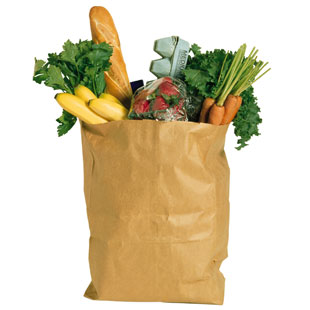

By Hilary Meyer, Associate Food Editor, EatingWell Magazine
I am guilty of letting some things “go” in my fridge. I don’t finish all my salad greens, so they wilt and I throw them out or I find blue fuzzy mold in the sour cream, so I toss it. A little waste here and there feels harmless, but I certainly wouldn’t ever throw dollar bills in the trash can and, in a roundabout way, that’s what I’m doing when I throw out rotten food.
Don’t Miss: 6 Ways to Save $2,997 on Groceries
I bet if I figured out how much food I wasted over the course of a year, I might be a little more aggressive about using it all up. The average American wastes more than 200 pounds of food a year -- that’s a lot of wasted dollars too! Here are a few tips that may help you and me stop wasting food and money:
1. Check expiration dates before you buy: This may seem like a no-brainer, but often you’ll find varying expiration dates on identical products. Stores use expiration dates to indicate freshness, moving the newer products to the back of the shelf with the older ones within grabbing distance. If you want the ultimate in freshness, check the products behind what’s directly in front of you -- you may find fresher ones hidden there.
2. At the meat counter ask for the freshest cuts: The meat behind the counter may look good (and chances are it probably is), but you can’t tell by looking how long it has been on display. You could ask the butcher how long it’s been there or you could ask for a fresher cut from the back. Your eyes and nose never lie -- meat starts to color after it’s been cut, so if beef looks dark or pork looks a little gray, avoid it and get another piece. It may be hard to smell if your meat is packaged, but if it has a strong odor, avoid it.
3. Store your food properly: Proper storage is key when it comes to making food last. Store raw meat in the meat drawer away from cooked food to avoid contamination and to keep the temperature consistently cold. Dairy items should be kept in the back of the fridge -- not on the door. Even dry goods don’t last forever. Canned and boxed foods are best kept in a cool, dark pantry away from heat; store things like nuts and whole-wheat flour in the fridge or freezer.
Read More: 5 Vegetables You Shouldn’t Keep in Your Refrigerator
5 Surprising Foods You Should Refrigerate
4. Inspect food before you buy it: Ever come home and wonder why you bought an apple with a bruise on it? Or bread or berries with fuzz growing on them? It’s because you were shopping on autopilot. Take some time to look at what you are buying. Giving it a once-over will help you avoid disappointment (and save you time rebuying or returning the item) when you find flaws after your purchase.
5. Make a date with your refrigerator: Once your food is home, keep tabs on it. Move your perishables in plain view so you know what you have. Check the fridge before you go to the grocery store so you don’t purchase something new that you already have. Pick a day of the week to go through your fridge and see what’s in there and try to plan your meals around the stuff that’s nearing its expiration date.
Don’t Miss: 6 Common Myths About Freezing Foods
What are your best tips for not wasting food?
By Hilary Meyer, EatingWell Associate Food Editor

EatingWell Associate Food Editor Hilary Meyer spends much of her time in the EatingWell Test Kitchen, testing and developing healthy recipes. She is a graduate of New England Culinary Institute.
More from EatingWell: